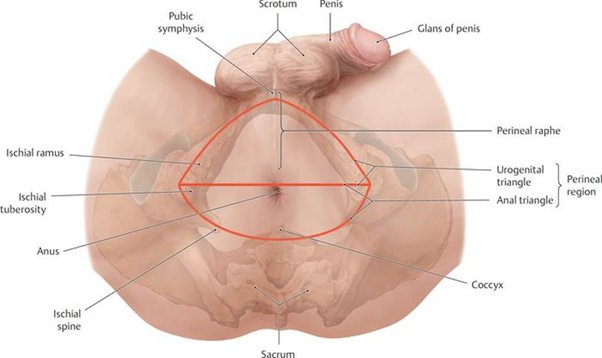Back
Why does my taint hurt (male)?
By Shannon Strauch, PTA, STMT-1 on 7/24/2024

Pain in the perineal area, also known as the "taint", "Gooch" or "grundle", can have several causes. The perineum, or the area between the genitals and the anus, is part of the pelvic floor, a group of muscles, ligaments, and connective tissues that support the organs within the pelvis, including the bladder and intestines.
Perineal pain can have several underlying causes, often related to issues with the pelvic floor muscles, nerves, or surrounding structures. Here’s a detailed look at the anatomy, potential causes of perineal pain in men, and how pelvic floor therapy can help:
Anatomy of the Male Pelvic Floor
Muscles
:Levator Ani Group
: Includes the pubococcygeus, puborectalis, and iliococcygeus muscles.
Coccygeus
: Provides support to the pelvic organs.
Bulbospongiosus and Ischiocavernosus
: Involved in erectile function and ejaculation.
External Anal Sphincter
: Controls bowel movements.
Nerves
:Pudendal Nerve
: Supplies sensation and motor control to the perineum, external genitalia, and anus.
Other Nerves
: Sacral nerves also contribute to the innervation of the pelvic floor.
Ligaments and Fascia
: Support the pelvic organs and muscles.
Common Causes of Perineal Pain in Men
Prostatitis
: Inflammation of the prostate gland, often causing pain in the perineum, lower back, and genital area.
Pudendal Neuralgia
: Irritation or entrapment of the pudendal nerve, leading to chronic pain in the perineum.
Pelvic Floor Dysfunction or Muscle Tightness
: Overactive or tight pelvic floor muscles can cause pain and discomfort.
Post-Surgical Pain
: Pain following surgeries such as prostatectomy or procedures involving the rectum.
Chronic Pelvic Pain Syndrome (CPPS)
: A condition characterized by chronic pain in the pelvic region, often without a clear cause.
Inguinal Hernia Repair
: Post-surgical pain from nerve damage or scar tissue formation can radiate to the perineal area.
Direct Trauma or Injury or Muscle Strain
: Injury from activities such as cycling, prolonged sitting, or accidents can cause perineal pain.
How Pelvic Floor Therapy Can Help
Muscle Assessment and Training
:Strengthening Exercises
: Strengthening weak pelvic floor muscles through targeted exercises like Kegels.
Relaxation Techniques
: Teaching relaxation techniques to address muscle tension and spasms, which can involve guided stretching and breathing exercises.
Manual Therapy
:Trigger Point Release
: Identifying and releasing tight spots or trigger points in the pelvic floor muscles.
Myofascial Release
: Techniques to release tension in the connective tissues, improving mobility and reducing pain.
Biofeedback
:Muscle Control
: Using biofeedback devices to help men learn to control and coordinate their pelvic floor muscles, improving function and reducing pain.
Pain Management
:Heat and Cold Therapy
: Applying heat or cold packs to reduce pain and inflammation in the perineal area.
Electrical Stimulation
: Using low-level electrical currents to stimulate nerves and muscles, helping to reduce pain and improve function.
Education and Lifestyle Modifications
:Posture and Body Mechanics
: Educating on proper posture and body mechanics to minimize strain on the pelvic floor.
Diet and Hydration
: Advising on dietary changes to prevent constipation and reduce strain on the pelvic floor muscles.
Behavioral Changes
: Modifying activities that contribute to pelvic floor dysfunction, such as reducing prolonged sitting or adjusting cycling habits.
Coordination with Other Treatments
:Medical Interventions
: Working with healthcare providers to address underlying medical conditions such as prostatitis or chronic pelvic pain syndrome.
Psychological Support
: Addressing any psychological factors that may contribute to chronic pain, such as stress or anxiety, through counseling or stress management techniques.
Conclusion
Pelvic floor therapy can be highly effective in addressing perineal pain in men by focusing on muscle function, nerve health, and overall pelvic health. If you're experiencing persistent perineal pain, reach out to us at Pelvic Health Center in Madison, NJ to set up an evaluation and treatment! Feel free to call us at 908-443-9880 or email us at receptionmadison@pelvichealthnj.com.
Read More:
How Chronic Pelvic Congestion in Men Contributes to Prostatitis By Shannon Strauch, PTA, STMT-1 on 12/11/2024 How lymphatic issues can cause symptoms of prostatitis Prostatitis and Tight Pelvic Floor Muscles: A Comprehensive Guide By Shannon Strauch, PTA, STMT-1 on 12/10/2024 How a tight pelvic floor can be the reason for prostatitis symptoms
Are you ready to live pain free?
Request An Appointment